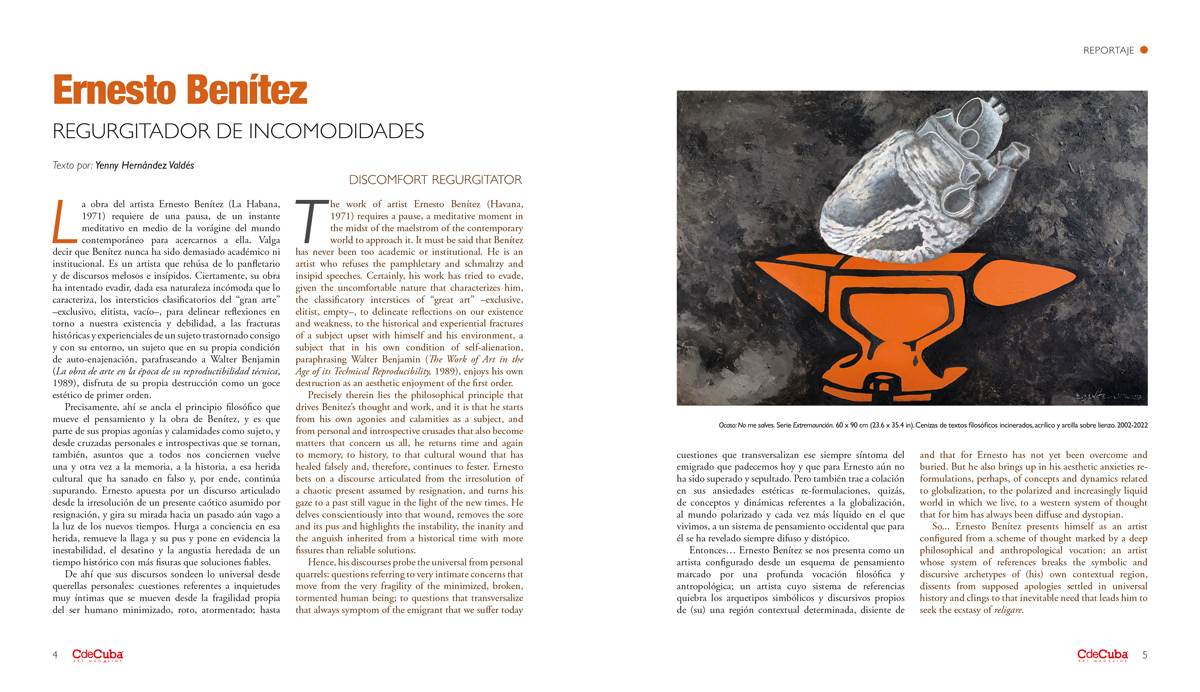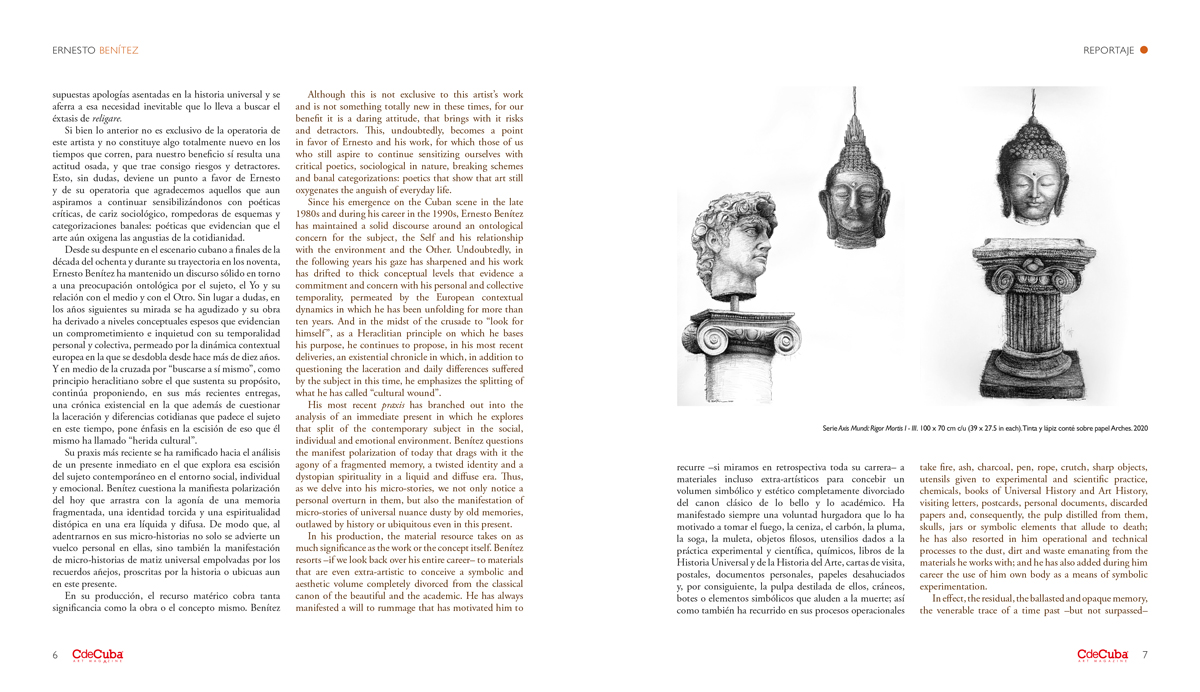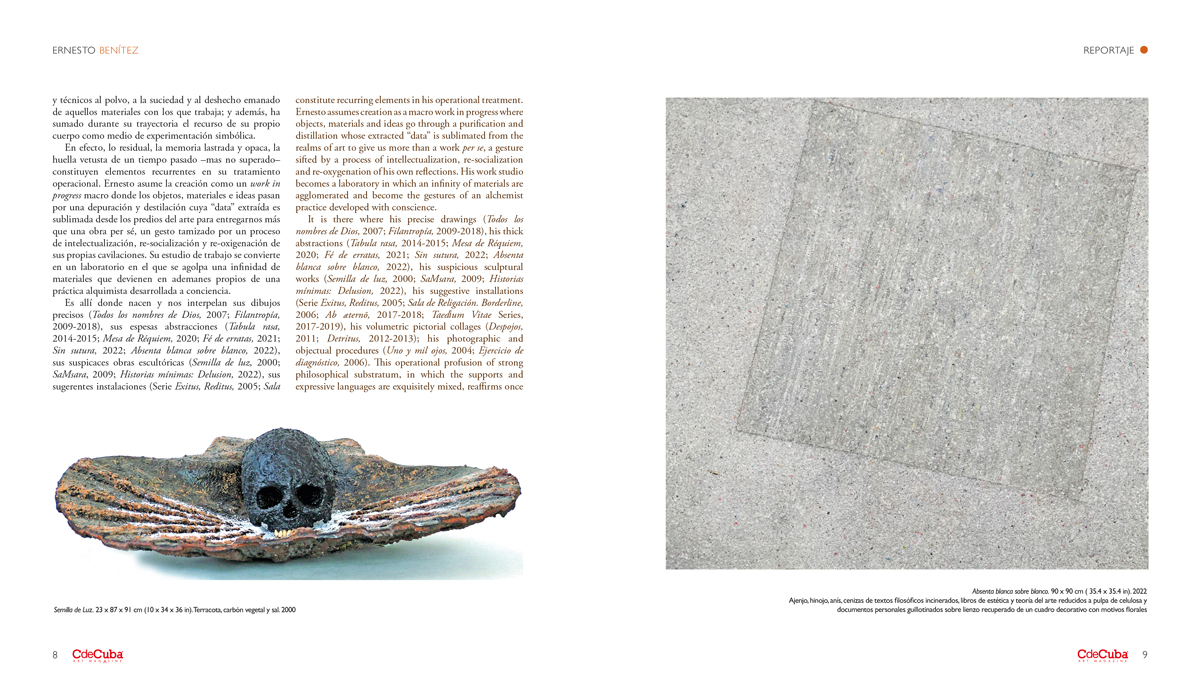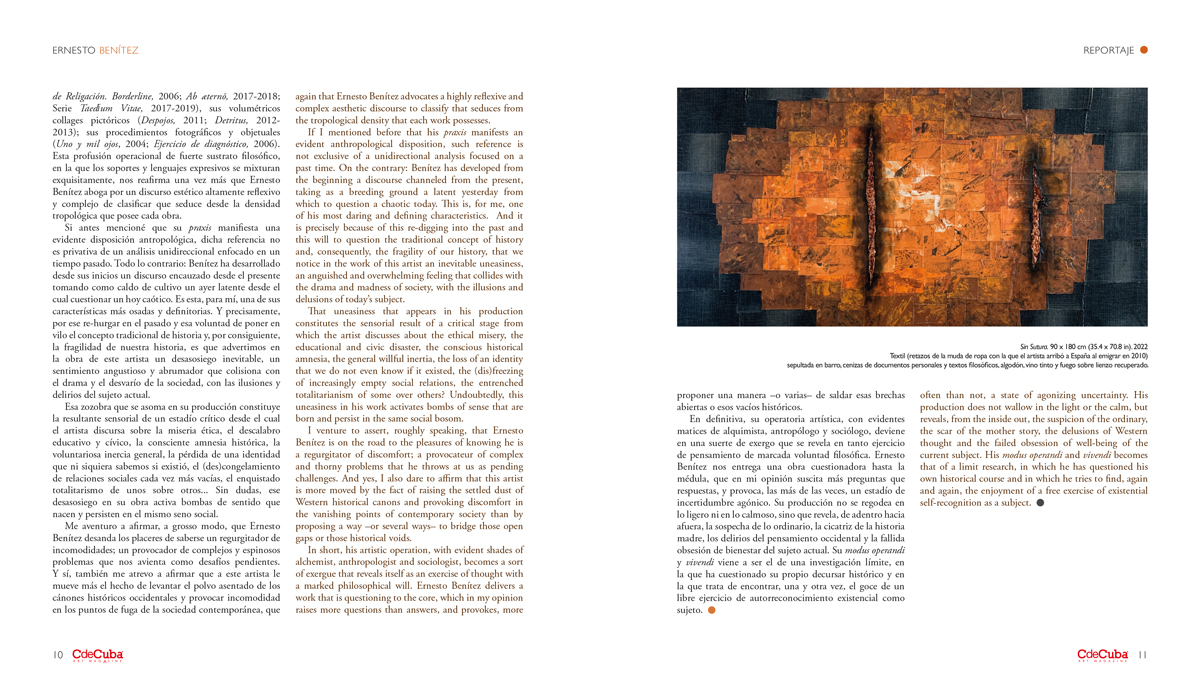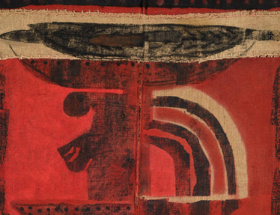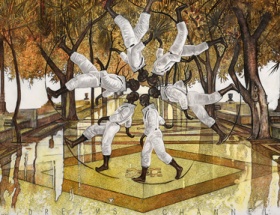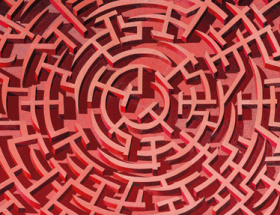Discomfort Regurgitator
By Yenny Hernández Valdés
The work of artist Ernesto Benítez (Havana, 1971) requires a pause, a meditative moment in the midst of the maelstrom of the contemporary world to approach it. It must be said that Benítez has never been too academic or institutional. He is an artist who refuses the pamphletary and schmaltzy and insipid speeches. Certainly, his work has tried to evade, given the uncomfortable nature that characterizes him, the classificatory interstices of “great art” –exclusive, elitist, empty–, to delineate reflections on our existence and weakness, to the historical and experiential fractures of a subject upset with himself and his environment, a subject that in his own condition of self-alienation, paraphrasing Walter Benjamin (The Work of Art in the Age of its Technical Reproducibility, 1989), enjoys his own destruction as an aesthetic enjoyment of the first order.
Precisely therein lies the philosophical principle that drives Benitez’s thought and work, and it is that he starts from his own agonies and calamities as a subject, and from personal and introspective crusades that also become matters that concern us all, he returns time and again to memory, to history, to that cultural wound that has healed falsely and, therefore, continues to fester. Ernesto bets on a discourse articulated from the irresolution of a chaotic present assumed by resignation, and turns his gaze to a past still vague in the light of the new times. He delves conscientiously into that wound, removes the sore and its pus and highlights the instability, the inanity and the anguish inherited from a historical time with more fissures than reliable solutions.
Hence, his discourses probe the universal from personal quarrels: questions referring to very intimate concerns that move from the very fragility of the minimized, broken, tormented human being; to questions that transversalize that always symptom of the emigrant that we suffer today and that for Ernesto has not yet been overcome and buried. But he also brings up in his aesthetic anxieties re-formulations, perhaps, of concepts and dynamics related to globalization, to the polarized and increasingly liquid world in which we live, to a western system of thought that for him has always been diffuse and dystopian.
So… Ernesto Benítez presents himself as an artist configured from a scheme of thought marked by a deep philosophical and anthropological vocation; an artist whose system of references breaks the symbolic and discursive archetypes of (his) own contextual region, dissents from supposed apologies settled in universal history and clings to that inevitable need that leads him to seek the ecstasy of religare.
Although this is not exclusive to this artist’s work and is not something totally new in these times, for our benefit it is a daring attitude, that brings with it risks and detractors. This, undoubtedly, becomes a point in favor of Ernesto and his work, for which those of us who still aspire to continue sensitizing ourselves with critical poetics, sociological in nature, breaking schemes and banal categorizations: poetics that show that art still oxygenates the anguish of everyday life.
Since his emergence on the Cuban scene in the late 1980s and during his career in the 1990s, Ernesto Benítez has maintained a solid discourse around an ontological concern for the subject, the Self and his relationship with the environment and the Other. Undoubtedly, in the following years his gaze has sharpened and his work has drifted to thick conceptual levels that evidence a commitment and concern with his personal and collective temporality, permeated by the European contextual dynamics in which he has been unfolding for more than ten years. And in the midst of the crusade to “look for himself”, as a Heraclitian principle on which he bases his purpose, he continues to propose, in his most recent deliveries, an existential chronicle in which, in addition to questioning the laceration and daily differences suffered by the subject in this time, he emphasizes the splitting of what he has called “cultural wound”.
His most recent praxis has branched out into the analysis of an immediate present in which he explores that split of the contemporary subject in the social, individual and emotional environment. Benítez questions the manifest polarization of today that drags with it the agony of a fragmented memory, a twisted identity and a dystopian spirituality in a liquid and diffuse era. Thus, as we delve into his micro-stories, we not only notice a personal overturn in them, but also the manifestation of micro-stories of universal nuance dusty by old memories, outlawed by history or ubiquitous even in this present.
In his production, the material resource takes on as much significance as the work or the concept itself. Benítez resorts –if we look back over his entire career– to materials that are even extra-artistic to conceive a symbolic and aesthetic volume completely divorced from the classical canon of the beautiful and the academic. He has always manifested a will to rummage that has motivated him to take fire, ash, charcoal, pen, rope, crutch, sharp objects, utensils given to experimental and scientific practice, chemicals, books of Universal History and Art History, visiting letters, postcards, personal documents, discarded papers and, consequently, the pulp distilled from them, skulls, jars or symbolic elements that allude to death; he has also resorted in him operational and technical processes to the dust, dirt and waste emanating from the materials she works with; and he has also added during him career the use of her own body as a means of symbolic experimentation.
In effect, the residual, the ballasted and opaque memory, the venerable trace of a time past –but not surpassed– constitute recurring elements in his operational treatment. Ernesto assumes creation as a macro work in progress where objects, materials and ideas go through a purification and distillation whose extracted “data” is sublimated from the realms of art to give us more than a work per se, a gesture sifted by a process of intellectualization, re-socialization and re-oxygenation of his own reflections. His work studio becomes a laboratory in which an infinity of materials are agglomerated and become the gestures of an alchemist practice developed with conscience.
It is there where his precise drawings (Todos los nombres de Dios, 2007; Filantropía, 2009-2018), his thick abstractions (Tabula rasa, 2014-2015; Mesa de Réquiem, 2020; Fé de erratas, 2021; Sin sutura, 2022; Absenta blanca sobre blanco, 2022), his suspicious sculptural works (Semilla de luz, 2000; SaMsara, 2009; Historias mínimas: Delusion, 2022), his suggestive installations (Serie Exitus, Reditus, 2005; Sala de Religación. Borderline, 2006; Ab æternō, 2017-2018; Taedĭum Vitae Series, 2017-2019), his volumetric pictorial collages (Despojos, 2011; Detritus, 2012-2013); his photographic and objectual procedures (Uno y mil ojos, 2004; Ejercicio de diagnóstico, 2006). This operational profusion of strong philosophical substratum, in which the supports and expressive languages are exquisitely mixed, reaffirms once again that Ernesto Benítez advocates a highly reflexive and complex aesthetic discourse to classify that seduces from the tropological density that each work possesses.
If I mentioned before that his praxis manifests an evident anthropological disposition, such reference is not exclusive of a unidirectional analysis focused on a past time. On the contrary: Benítez has developed from the beginning a discourse channeled from the present, taking as a breeding ground a latent yesterday from which to question a chaotic today. This is, for me, one of his most daring and defining characteristics. And it is precisely because of this re-digging into the past and this will to question the traditional concept of history and, consequently, the fragility of our history, that we notice in the work of this artist an inevitable uneasiness, an anguished and overwhelming feeling that collides with the drama and madness of society, with the illusions and delusions of today’s subject.
That uneasiness that appears in his production constitutes the sensorial result of a critical stage from which the artist discusses about the ethical misery, the educational and civic disaster, the conscious historical amnesia, the general willful inertia, the loss of an identity that we do not even know if it existed, the (dis)freezing of increasingly empty social relations, the entrenched totalitarianism of some over others? Undoubtedly, this uneasiness in his work activates bombs of sense that are born and persist in the same social bosom.
I venture to assert, roughly speaking, that Ernesto Benítez is on the road to the pleasures of knowing he is a regurgitator of discomfort; a provocateur of complex and thorny problems that he throws at us as pending challenges. And yes, I also dare to affirm that this artist is more moved by the fact of raising the settled dust of Western historical canons and provoking discomfort in the vanishing points of contemporary society than by proposing a way –or several ways– to bridge those open gaps or those historical voids.
In short, his artistic operation, with evident shades of alchemist, anthropologist and sociologist, becomes a sort of exergue that reveals itself as an exercise of thought with a marked philosophical will. Ernesto Benítez delivers a work that is questioning to the core, which in my opinion raises more questions than answers, and provokes, more often than not, a state of agonizing uncertainty. His production does not wallow in the light or the calm, but reveals, from the inside out, the suspicion of the ordinary, the scar of the mother story, the delusions of Western thought and the failed obsession of well-being of the current subject. His modus operandi and vivendi becomes that of a limit research, in which he has questioned his own historical course and in which he tries to find, again and again, the enjoyment of a free exercise of existential self-recognition as a subject.
